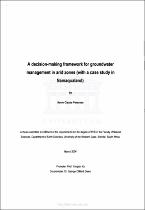| dc.description.abstract | The main aim of the work on which this thesis is based was to develop a framework for sustainable management of groundwater resources in arid zones with emphasis on Namaqualand in the north western region of South Africa. The first part of the thesis focuses on describing the groundwater resource base and legislative framework for groundwater management. Most aquifers in South Africa occur in fractured rock ranging in age from earliest Pre-Cambrian to Jurassic. Primary aquifers are mostly restricted to the coastal plains and river deposits.
Characterisation of the fractured rock aquifers has been limited. Thus, an inadequate knowledge base exists in a number of hydrogeological domains to understand the attributes and dynamics of fractured rock aquifers. A serious shortcoming in our knowledge base is to understand the institutional arrangements necessary for proper resource management. This is particularly important in view of the National Water Act of 1998, where groundwater is subject to the same protection measures as surface water. These measures are sophisticated and require tools and technologies to be developed to support sustainable groundwater management and utilisation.
The technical, economic, social, legal, political, and environmental issues affecting groundwater management of arid zones of South Africa were analysed. The objectives and appropriate measures to overcome the barriers for sustainable development were also presented. This was necessary to structure the decision problem and to generate and identify the decision alternatives. Thus decision alternatives have been formulated for the various elements of the objectives in order to achieve preferred scenarios.
The main part of the thesis was the development of a decision-making framework for groundwater management in the arid zones of Namaqualand. A multiple criteria decision analysis (MCDA) approach was adopted to assist in the formulation of the decision-making framework. ln order to select the most appropriate MCDA technique, some background was required on the theoretical aspects. A value
function method was selected, which provides decision support by interval SMART/SWING. This method incorporates informational uncertainty through interval judgements. The decision problem supported the selection of this method because of the discrete alternatives and uncertainty associated with groundwater management. Further, the method provided an interactive technique to interrogate
various decision alternatives based on prior knowledge of the decision-maker. The software WINPRE was utilised in the value tree construction and analyses, A number of value trees and attributes were defined. These attributes were evaluated against the identified alternatives.
This provided a systematic framework for the analytical understanding of the problem. As a result a number of preferred alternatives were elicited. The analyses resulted in a model for groundwater management in arid zones. The ideal state for
groundwater management was presented, but in practice this is difficult to implement, mainly because of human and financial resources. As a result, a critical path was established based on the analyses done in this thesis. This was applied to the Namaqualand example. ln this example the activities to support a Catchment Management Strategy was identified. This means that the decision-maker is able
to focus on issues that are deemed important. More importantly, the method allows the decision-maker to develop the various consequences of the alternatives with stakeholders. As a result of the decision model a number of strategies were proposed for sustainable groundwater management in arid zones with a case study in Namaqualand. A consequences table were developed which could be used for M&E purposes. | en_US |

